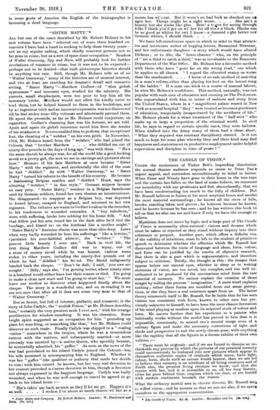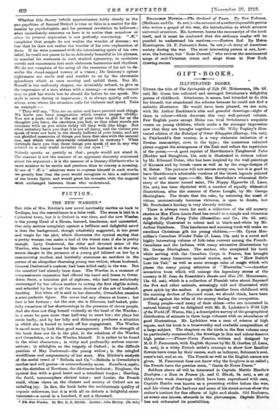THE CANDLE OF VISION.*
UNDER the excitement of Tinker Beira impending dissolution the normal theatre audience responds en masse to Peter Pan's urgent appeal, and surrenders unconditionally to belief in fairies.
When Peter and Wendy have gone to their home in the tree-tops and the curtain has fallen on the land of make-believe, we reassume our incredulity with our greatcoats and feel, shamefacedly, that we have been condescending too much to the folly of children. But Mr. Russell believes in fairies at his most sceptical hours and amidst the most material surroundings ; he knows all the elves of hills, brooks, standing lakes, and 'groves ; he believes because he knows, and he knows because he has seen ; and he has written this book to tell us that we also can see and know if only we have the courage to believe.
Mysticism does not move by logic, and a large part of The Candle of Vision is necessarily ultra-rational : visions and dreams which must be taken or rejected as they stand without inquiry into their coherence or purport. Another part, which offers a definite test of the validity of intuitions, must be left to the student of primitive speech to determine whether the affinities which Mr. Russell has discovered between the roots of language and ideas, force, colour, and form can be justified by the results of objective research. But there is also a part which is argumentative, and therefore subject to criticism. Briefly, the thought is this : the images that appear before our mental eyes, whether in sleep or in waking moments of vision, aro too novel, too complex, and too well co- ordinated to be produced by the unconscious mind from the raw material of memory. We cannot explain the creation of these images by calling the process " imagination." A mere word explains nothing ; either these forms are moulded from our sense percep- tions, or else they have a real existence apart from us. The latter theory commends itself to Mr. Russell, for he holds that he has seen visions too consistent with facts, known to other men but pre- viously unknown to himself, to have been the mere chance formation of his mind playing at random upon its acquired stock of colour and form. He asserts further that his experience as a painter who habitually works without the model has proved to him that it is impossible, consciously, to amend one's mental image even of a solitary figure and make the necessary corrections of light and shade and perspective to suit the newly chosen pose, with anything like the rapidity that all the figures in a dream exhibit of their own
volition :—
" There must be originals : and if we are forced to dismiss as un- thinkable any process by which the pictures of our personal memory could unconsciously be reshaped into new pictures which appear in themselves authentic copies of originals which move, have light, colour, form, shade such as nature would bestow, then we are led to believe that memory is an attribute of all living creatures and of Earth also, the greatest living creature we know, and that she carries with her, and it is accessible to us, all her long history, cities far gone behind time; empires which are dust, or are buried with sunken continents beneath the waters."
What the ordinary mortal sees in chaotic dreams, Mr. Russell does
in willed vision ; and he assures us that we can see also, if we nerve ourselves to the appropriate concentration. I • The Candle bf Vision. By A. London : Macmillan and Co. pis. nay - Whether this theory (which approximates fairly closely to the pan-psychism of Samuel Butler) is true or false is a matter for dis- oussion by psychologists, and for personal revelation to believers ; what immediately concerns us here is to notice that somehow or other its present expression is not perfectly convincing. "
complains that people do not realize the wonder of dreams ; we fear that he does not realize the wonder of his own explanation of them. If he were possessed with the intoxicating spirit of his own belief, he could not pause to, be so delicately beautiful in his phrases, to marshal his sentences in such studied symmetry, to modulate vowels and consonants into such elaborate harmonies and rhythms. We do not complain of his using all the resources of his art to de- scribe the cloud-sapped towers of a vision ; Do Quincey's opium nightmares are male real and terrible to us by the chromatic splendours which at once envelop and unfold them. But. Mr. Russell is too uniformly elegant, too invariably refined, to give us the impression of a man ablaze with a message—a man who cannot atop to pick his words lest he should die before he can speak. His style is never daring or impetuous ; it is always quietly self-con- scious, even where the situation calls for violence and speed. Take an example :-
"They will say, ' You are an artist and have painted such things. We know you have imagination which creates imagee vividly. You are a poet, and it is the art of your tribe to gild for us the thoughts you have, the emotions you feel, so that what moods are common with us you attire richly till they walk like kings. But what certainty have you that it is not all fancy, and the visions you. speak of were not born in the cloudy hollows of your brain, and are not glorified memories of things you have first seen with the sensual eye, and which were afterwards refashioned in memory ? What certitude have you that these things you speak of are in any way related to a real world invisible to our eyes ? ' "
Nobody speaks as prettily as that ; people would not stand it. The manner is not the manner of an opponent sincerely concerned about his argument ; it is the manner of a literary dilettantewho is more anxious- to be exotic and precious than to convey a meaning.
If one of " " admirers were to express himself- in such words, we greatly fear that the poet would recognize in him a oultivator of the Ironic Spirit, and would greet his remarks with the augural wink exchanged between those who understand.











































 Previous page
Previous page